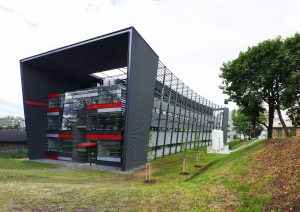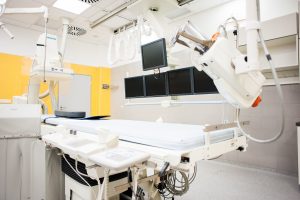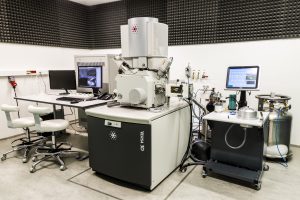Czechia as a Member of international research infrastructures in response to SARS-CoV-2 / Covid-19
The epidemic of the new strain of coronavirus SARS-CoV-2 and Covid-19 disease has caused all around the world health-related and socioeconomic impacts, which were unprecedented in the past decades. Measures to mitigate the immediate effects of the pandemic, as well as response, which will efficiently address invoked challenges, are necessarily knowledge-based, i.e. based on data and lessons learned from that data. Research infrastructures play one of the key roles in this context, as they provide the scientific community the most advanced knowledge, technologies and data resources, which effective fight with the SARS-CoV-2 / Covid-19 pandemic requires. At the same time, research infrastructures of international scope, nature and importance, which concentrate a critical mass of resources within their capacities to conduct the most demanding scientific experiments and research studies, bring essential multiplier effect, while making these resources available to their users at international level, enabling extensive international collaborations.
As a Member State of a number of international research infrastructures, Czechia is engaged with the efforts that the research community is developing in response to the SARS-CoV-2 / Covid-19 pandemic worldwide. Whether these are international R&D organizations established under public international law or European research infrastructure consortia established under the EU legal framework, Czechia fights SARS-CoV-2 / Covid-19 as an active Member of the world leading laboratories. The facilities listed below provide their user communities extensive experimental and data resources that are – given the current situation, requiring accelerated knowledge-based solutions – very often based on preferential treatment, favouring the SARS-CoV-2 / Covid-19 studies before research work of other nature.
EATRIS-CZ – Czech National Node to the European Infrastructure for Translational Medicine
EATRIS ERIC (European Advanced Translational Research Infrastructure in Medicine) and members of the consortium, including EATRIS-CZ (Czech National Node to the European Infrastructure for Translational Medicine), provides facilities to develop drugs, vaccines and diagnostics to reach “the first-in-human application” and clinical “proof-of-concept” verification. EATRIS ERIC is a partner of the EU-funded TRANSVAC-2 project that accelerates vaccine candidates across the R&D pipeline.
ECRIN-ERIC (European Clinical Research Infrastructure Network) in cooperation with its members, including CZECRIN (Czech National Node to the European Clinical Research Infrastructure Network), has established a COVID-19 taskforce working on a fast-track procedure for access and provision of various services in the field of clinical studies of Covid-19 disease.
BBMRI-ERIC’s (Biobanks and Biomolecular Resources Research Infrastructure Consortium) national nodes and biobanks, including BBMRI-CZ (Bank of Clinical Specimens), provide specific information on the resources they can make available to researchers from both academic and private sector, working on the development of drugs and vaccines against SARS-CoV-2 / Covid-19. BBMRI-ERIC network of 600+ biobanks provide key services to researchers in this regard.
EATRIS ERIC, ECRIN-ERIC and BBMRI-ERIC has jointly set up the COVID-19 Fast Response Service, as a coordinated and accelerated procedure for researchers to access academic facilities, services and resources of the three research infrastructures, working together under the umbrella of AMRI (Alliance of Medical Research Infrastructures).
CZECRIN – Czech National Node to the European Clinical Research Infrastructure Network
EU-OPENSCREEN ERIC (European Infrastructure of Open Screening Platforms for Chemical Biology) is actively involved in a broad range of activities to study the new coronavirus SARS-CoV-2, identify therapeutics to Covid-19 and search for diagnostics. EU-OPENSCREEN ERIC, including the European Chemical Biology Library operated by the Czech node CZ‑OPENSCREEN (National Infrastructure for Chemical Biology) is a partner in Horizon 2020 project proposal EUROCOVID.
Euro-BioImaging ERIC (European Research Infrastructure for Imaging Technologies in Biological and Biomedical Sciences), including its Czech national node Czech-BioImaging (National Research Infrastructure for Biological and Medical Imaging), provides imaging technology for biological and medical research. Detailed information on the support to tackle Covid-19 is available on dedicated webpage.
Instruct-ERIC (Integrated Structural Biology European Research Infrastructure Consortium), which is participated by CIISB (Czech Infrastructure for Integrative Structural Biology), has put together a catalogue of tools to support SARS-CoV-2 / Covid-19 research. Many Instruct-ERIC services are available via remote access, where samples can be sent for analysis without need for researchers to travel. More information is provided by the Instruct-ERIC Covid-19 Resource Centre.
ELIXIR (European Life-Science Infrastructure for Biological Information), participated by ELIXIR-CZ (Czech National Infrastructure for Biological Data), has set up an information webpage on Covid-19 support and established a contact for any related questions lauer@elixir-europe.org.
CIISB – Czech Infrastructure for Integrative Structural Biology
EMBL (European Molecular Biology Laboratory) has been collecting, sorting and processing SARS-CoV-2 related data since December 2019. Through bioinformatics outstation EMBL-EBI, Europe’s largest repository of molecular biological data, EMBL has created a special dedicated page to assist deposition and sharing of SARS-CoV-2 data into other molecular databases. Researchers can get support for submitting their data by addressing virus-dataflow@ebi.ac.uk before submission. Any questions regarding this topic can be sent also to contact@virusresource.embl.org.
CERN (European Organisation for Nuclear Research) has put in place a task force to explore how CERN technologies and competences can be placed at the service of society and contribute to the global fight against Covid-19. Proposals and ideas can be sent to covid@cern.ch. More details are available on a dedicated webpage.
ESA (European Space Agency) has issued two new initiatives related to understanding the effects that Covid-19 is imposing on society, economy and environment. One new call is a part of the ESA’s Earth Observation Science for Society programme. In addition to this call, ESA in coordination with the European Commission launched a special edition of the “Custom Script Contest”, focused on usage of Sentinel data. The contest calls for remote sensing experts, machine learning scientists as well as the interested public to submit ideas on how satellite data could help mitigate the situation for economic sectors, such as industry, commerce, transport and agriculture, but is also open to other ideas. ESA Education is launching Expedition: Home, a one-stop website for kids and parents to do fun space-based activities and keep learning while staying at home.
CESSDA ERIC (Consortium of European Social Science Data Archives), in which the Czech Republic is involved through CSDA (Czech Social Science Data Archive), facilitates the CORONA Work Life Survey, organized by the WageIndicator Foundation, showing the coronavirus-induced changes in living and working conditions in 110 countries all over the world. CLARIN ERIC (Common Language Resources and Technology Infrastructure), participated by LINDAT/CLARIAH-CZ (Digital Research Infrastructure for Language Technologies, Arts and Humanities), provides the Wagelndicator with hosting platform.
EMBL – European Molecular Biology Laboratory



